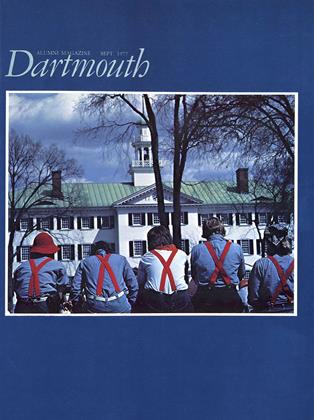"The importance of the conference was the need for black alumni to decide for themselves whether they want to be in- volved." That was how Keith Jackson '70, new president of the Black Alumni of Dartmouth Association, described a meeting of black alumni in Hanover in July. "We organized the conference ourselves, with very little contact with officers and staff on campus. We purposely asked for little support to prove to ourselves that it could be done."
Sixty-five alumni, about ten per cent of all living black alumni, attended the conference, a figure which Jackson felt proved that it could be done and answered the question about involvement. He characterized the result as "turning the page."
Financial involvement was the main theme of the conference. "The bottom line," Jackson said, was "establishing a donating attitude." There was talk of a collective gift in memory of all deceased black alumni and, at the most ambitious, of endowing an academic chair.
Most participants in the conference were graduates of the last decade, and for some the question of financial involvement may have seemed an abrupt turnabout from the turmoil of the sixties. Jackson explained: "It takes five years to learn what Dart- mouth meant. When we got out, it was a good feeling to be paroled, but now we recognize a tradition of excellence - like three black Rhodes Scholars in four years."
Besides finances, the black alumni discussed issues common to just about any Dartmouth group anywhere: the impact of coeducation, year-round operation and its effect on class camaraderie ("not necessarily in the negative sense"), admissions, and athletics. And there were more specialized topics: involvement in the campus black community, assistance in recruiting black faculty, worry about the possible demise of the Black Studies program.
Although most of the participants were under 35, Jackson said that "important linkages" were made to older alumni, including William Dent '13, who came from Amagansett, New York, and is the oldest living black alumnus. Whether or not youth predominated, Jackson admitted with a laugh that an optional slam-dunk contest on the last day of the conference was "cancelled due to the average age of the participants."
 View Full Issue
View Full Issue
More From This Issue
-
 Feature
FeatureScience and Technology Under Siege
September | October 1977 By Thomas Laaspere -
 Feature
FeatureThirty-Eight Days Alone
September | October 1977 By Ned Roesler -
 Feature
FeatureDartmouth Passages
September | October 1977 By Marshall Ledger -
 Feature
FeatureWorlds Together
September | October 1977 -
 Article
ArticleFanciers
September | October 1977 By BRAD HILLS '65 -
 Class Notes
Class Notes1927
September | October 1977 By ERWIN B. PADDOCK







